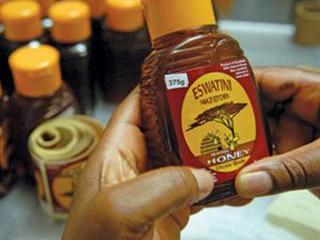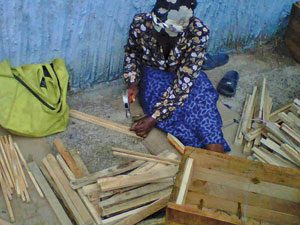
The art of bee-keeping has been embraced by vulnerable child- and grandparent-headed homesteads in Swaziland as a means to generate an income. Introduced in 2007 by Manzini Youth Care (MYC), a faith-based non-profit organisation, the Eswatini Swazi Kitchen project has re-invigorated the honey industry’s ability to create sustainable jobs.
“More than 20% of all rural households in Swaziland are headed by children under the age of 16 or elderly grandparents due to HIV/Aids-related deaths. These households suffer from a lack of food, education and psycho-social support, among many other issues,” says Eswatini Kitchen Honey manager Vusie Nkambule. Training in bee-keeping and honey production gives these households a valuable income stream, which helps them gain a foothold on slippery ground.
It has also allowed for the expansion of the product offerings of Eswatini Swazi Kitchen, which manufactures a range of gourmet jams, jellies, chutneys and sauces. Not only does Eswatini Swazi Kitchen employ 50 people – predominantly women from underprivileged backgrounds – but it channels revenue into the community by buying the fresh vegetables and fruit used in processing from over 100 local farmers, and the hand-woven baskets and wooden spoons for gift packaging from the community.

Vusi Nkambule
Profits help fund MYC’s programmes, which include residential care, free primary education and skills training for more than 2 000 youths. The Eswatini Kitchen Honey processing plant is the largest of its kind in Swaziland and is located at the Eswatini Swazi Kitchen factory in Manzini. Here, 11 people produce a range of products, such as wax, creamed honey, pure honey and cinnamon honey.
The project is thriving, with the number of bee-keepers supplying the factory increasing from 200 in 2009 to 485 in 2012. The quantity of combed honey bought by the factory has increased from 8t/year in 2008, to 14t in 2009 and 28t in 2011. At current levels, the project injects R546 000 into empty pockets annually.
Promoting honey
An important partner in the honey industry is TechnoServe, an international non-profit organisation that provides business solutions to poor communities. TechnoServe used its knowledge of the honey market to develop an industry strategic plan, which it has shared with relevant stakeholders in the government and private sector.
TechnoServe has worked closely with Eswatini Kitchen Honey to grow the formal market for honey, to improve its marketing and production systems, and to improve its linkages to local bee-keepers. TechnoServe has also worked directly with honey producers, providing training and market access for over 450 rural bee-keepers. There are still an estimated 824 untrained bee-keepers in Swaziland.
“Swazi bee-keepers generally lack the technical knowledge to produce at their full capacity and sell most of their honey at informal markets, limiting their potential income. But when properly instructed, bee-keeping and harvesting honey is not labour intensive and requires less than 10% of a farmer’s time. A well-managed Swazi top-bar hive, if maintained under the best natural conditions, can generate US$170/year (R1 400/year),” says Debbie Cutting, deputy country director at TechnoServe’s Swaziland office.

A bee-keeper undergoes practical training in the making of a top-bar hive. Trained bee-keepers harvest about 105t of honey a year.”
TechnoServe identified poor apiary and hive management as the main contributor to low hive production. As a result, the rural bee-keepers course addresses these issues, the curriculum including trapping and transferring of a swarm; hive management (mainly focusing on hive inspection); harvesting; preventing bees from migrating; and marketing.
Improvements
TechnoServe also played a key part in the founding of the National Honey Council in 2007, a group that addresses industry concerns. “We are Hazard Analysis and Critical Control Points (a preventative food safety system) compliant which gives us access to international markets such as South Africa, Europe, US and Australia. If we could develop more markets, we could increase production as our facilities can process 4t a month,” says Vusie.
Currently, 500kg of honey and 100kg of wax is exported to South Africa, while the local Swazi market consumes 21t and Mozambique 1t. The main markets for the wax are Swazi candles, bee-keepers and a body and face cream manufacturer.
Eswatini Kitchen Honey is currently in talks with the South African Department of Agriculture, Forestry and Fisheries to permit its honey into SA without radiation treatment.
“Swaziland’s agricultural ministry is conducting surveillance on diseases such as American Foul Brood (AFB) and it has never had such a case. Our honey is not radiated for these reasons. Our agriculture ministry will send a report on AFB to the World Organisation for Animal Health (OIE) which will then send it to South Africa. Hopefully we will then be in a position to market our own brand and quality in South Africa.”
Vusie says that training in bee-keeping and honey production has transformed many lives. “Most people were able to build homes, send their grandchildren to school and put food on the table using income from the bees. I hope that co-operation between the governments of South Africa and Swaziland will allow our bee-keeping industry to improve even further,” Vusie concludes.
Contact Vusie Nkambule on 078 151 2339 or at [email protected]













